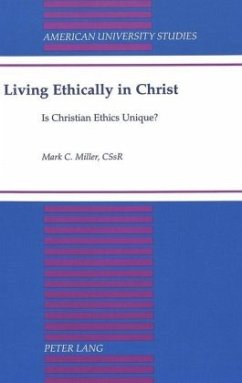Is there any difference between Christian ethics and philosophical ethics? Does Christian faith change the content of ethical theory for believers? This book attempts to understand the troubling nature of the question and the importance of an answer that depends less on ethical systems than on ethical activity. The book uses Bernard Lonergan's turn to the human subject as a foundational point for understanding ethical reasoning. By also engaging the insights of language philosophy, the work demonstrates the uniqueness of Christian ethics and its openness to sharing its truths with all other traditions.
"Mark Miller's study of Bernard Lonergan takes a major step forward in utilizing Lonergan's theological method to make a contribution to the on-going debate among theologians on the specificity of Christian ethics. The result is to create a discussion between Lonergan and theologians and philosophers of the stature of Alastair MacIntyre, Stephen Toulmin, Michael Polanyi, Garrett Barden, James Ross, and David Burrell.
With few exceptions, Lonergan's ideas about theological method have gotten little attention from Christian ethicists and moral philosophers. By bringing Lonergan's ideas into the lively discussion about the specificity of Christian ethics, Miller not only enriches that discussion, but also shows that Lonergan is a neglected resource for both theological and philosophical ethics. This is a welcome book indeed." (John P. Boyle, Professor, School of Religion, University of Iowa)
"Mark Miller has shown how the work of Bernard Lonergan incorporates attention not only to analytic skills, but also to the focus of a theologian on transcendent matters of faith. For it is not simply the words we use, but the living context in which they are spoken, that gives them their ethical import. It is precisely this 'performative' dimension in ethics itself that Lonergan's analysis of human knowing brings to the fore, so that Christian ethics becomes very much a matter of faithful reflection on the life to which a community of Christians aspires." (David Burrell, C.S.C., Department of Philosophy, University of Notre Dame)
With few exceptions, Lonergan's ideas about theological method have gotten little attention from Christian ethicists and moral philosophers. By bringing Lonergan's ideas into the lively discussion about the specificity of Christian ethics, Miller not only enriches that discussion, but also shows that Lonergan is a neglected resource for both theological and philosophical ethics. This is a welcome book indeed." (John P. Boyle, Professor, School of Religion, University of Iowa)
"Mark Miller has shown how the work of Bernard Lonergan incorporates attention not only to analytic skills, but also to the focus of a theologian on transcendent matters of faith. For it is not simply the words we use, but the living context in which they are spoken, that gives them their ethical import. It is precisely this 'performative' dimension in ethics itself that Lonergan's analysis of human knowing brings to the fore, so that Christian ethics becomes very much a matter of faithful reflection on the life to which a community of Christians aspires." (David Burrell, C.S.C., Department of Philosophy, University of Notre Dame)

